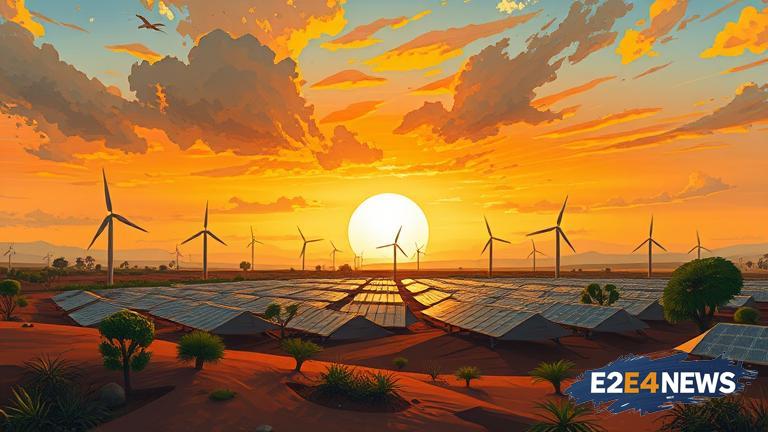Africa has been at the forefront of the global transition to renewable energy, with many countries on the continent investing heavily in solar, wind, and hydroelectric power. The African Union has set ambitious targets to increase the share of renewable energy in the continent’s energy mix, with a goal of achieving 100% renewable energy by 2060. South Africa, for example, has made significant strides in renewable energy, with solar and wind power accounting for over 10% of the country’s energy mix. Kenya has also been a leader in renewable energy, with geothermal power generating over 50% of the country’s electricity. Morocco has invested heavily in solar power, with the Noor-Ouarzazate complex being one of the largest solar farms in the world. Egypt has also made significant investments in renewable energy, with a goal of generating 20% of its electricity from renewable sources by 2022. The use of renewable energy in Africa has numerous benefits, including reducing dependence on fossil fuels, mitigating climate change, and improving energy access for millions of people. Renewable energy can also create jobs and stimulate local economies, with the International Renewable Energy Agency (IRENA) estimating that the renewable energy sector could support up to 24 million jobs globally by 2030. However, despite the many benefits of renewable energy, there are still significant challenges to overcome, including the high upfront costs of investing in renewable energy infrastructure and the need for greater investment in energy storage and grid infrastructure. To address these challenges, many African countries are turning to innovative financing models, such as green bonds and crowdfunding, to raise capital for renewable energy projects. The African Development Bank has also launched a number of initiatives to support the development of renewable energy on the continent, including the Sustainable Energy Fund for Africa. The fund provides financing for renewable energy projects, as well as technical assistance and capacity building for governments and private sector developers. In addition to these efforts, there is a growing recognition of the importance of energy access for economic development and poverty reduction. The United Nations’ Sustainable Development Goal 7 (SDG 7) calls for universal access to affordable, reliable, and modern energy services by 2030. Achieving this goal will require significant investment in renewable energy, as well as efforts to improve energy efficiency and reduce energy waste. Many African countries are also exploring the potential of renewable energy to support economic development, including the use of solar power to support agriculture and industry. For example, a number of companies in East Africa are using solar power to irrigate crops and power farming equipment, reducing their reliance on diesel generators and improving their productivity. Similarly, a number of industrial companies in South Africa are using renewable energy to power their operations, reducing their energy costs and improving their competitiveness. The use of renewable energy in Africa is also having a positive impact on the environment, reducing greenhouse gas emissions and mitigating the impacts of climate change. Climate change is having a devastating impact on many African countries, with more frequent droughts, floods, and heatwaves affecting agricultural productivity and human health. By transitioning to renewable energy, African countries can reduce their reliance on fossil fuels and mitigate the worst impacts of climate change. In conclusion, Africa’s renewable energy revolution is gaining momentum, with many countries on the continent investing heavily in solar, wind, and hydroelectric power. While there are still significant challenges to overcome, the benefits of renewable energy are clear, and the continent is well on its way to achieving a sustainable energy future. The future of renewable energy in Africa looks bright, with the potential to create jobs, stimulate local economies, and improve energy access for millions of people. As the continent continues to transition to renewable energy, it is likely that we will see significant economic, social, and environmental benefits, and a more sustainable future for generations to come.
